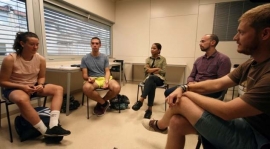Ernest Casaponsa, a 30-year-old with a Lasallian youth background, began the dialogue with a striking sentence: "In the Church, those who do not live the Church decide." "Even if we talk about women, we don't invite women; even if we talk about young people, we are not invited." If they occasionally do so, he added, "it is the most the Church does, but ecclesiastically speaking: women and young people do not exist."
One of the dangers of the Church is "that changes are produced by necessity and not by conviction," added Òscar Millán; this is the case, he claimed, of women, there "when men can't."
"If you look at the nominations of Pope Francis, one sees some women in the Dicasteries," said Manuel Olid of the Salesian Youth Movement. "The local Church has already made this change. If you look at parish councils, who coordinates the catechists? Who leads the liturgy? The majority of the votes in the pastoral councils are female, the voice of the parishes is feminine."
For Gisela Pruna, supernumerary of Opus Dei, it is clear the Church must modernize itself, but it does not imply a change in the message. For her, the problem lies not only in a lack of adaptation, but in not having truly understood the Gospel.
Manu, for his part, focused on how faith should be transmitted; clearly, he said, "a parish without young people does not attract other young people."
One of the important challenges for the Church is "doing pedagogy of the language used". Héctor Ganivet, of the bishopric of Sant Feliu de Llobregat, acknowledged that young Christians often find themselves "in a mine field, where we must avoid the concepts known to trigger alarms, create walls and block the discourse."
What has become clear at the meeting is that one must continue to wager on an open Church where, according to Abril Fabà, "there will be room for people who years ago, perhaps, did not feel identified and are part of new social realities."


